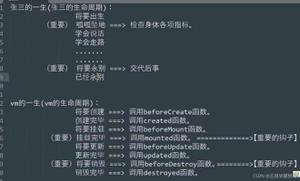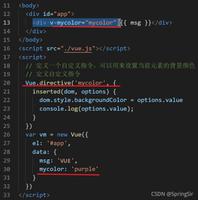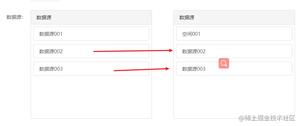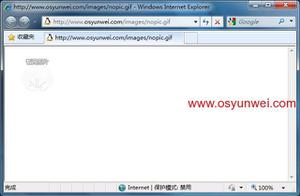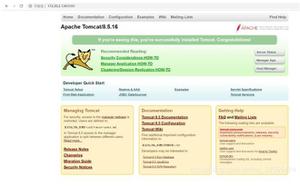Vue父子组件生命周期
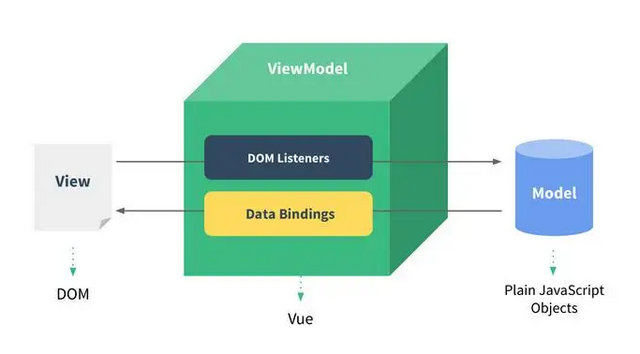
Vue实例需要经过创建、初始化数据、编译模板、挂载DOM、渲染、更新、渲染、卸载等一系列过程,这个过程就是Vue的生命周期,Vue中提供的钩子函数有beforeCreate、created、beforeMount、mounted、beforeUpdate、updated、beforeDestroy、destroyed,父子组件嵌套时,父组件和子组件各拥有各自独立的钩子函数。
描述
创建过程
创建过程主要涉及beforeCreate、created、beforeMount、mounted四个钩子函数。
Parent beforeCreate -> Parent Created -> Parent BeforeMount -> Child BeforeCreate -> Child Created -> Child BeforeMount -> Child Mounted -> Parent Mounted更新过程
更新过程主要涉及beforeUpdate、updated两个钩子函数,当父子组件有数据传递时才会有生命周期的比较。
Parent BeforeUpdate -> Child BeforeUpdate -> Child Updated -> Parent Updated销毁过程
销毁过程主要涉及beforeDestroy、destroyed两个钩子函数,本例直接调用vm.$destroy()销毁整个实例以达到销毁父子组件的目的。
Parent BeforeDestroy -> Child BeforeDestroy -> Child Destroyed -> Parent Destroyed示例
<!DOCTYPE html><html>
<head>
<title>Vue父子组件生命周期</title>
</head>
<body>
<div ></div>
</body>
<script src="https://cdn.bootcss.com/vue/2.4.2/vue.js"></script>
<script type="text/javascript">
Vue.component("counter", {
props: {
count: {
type: Number,
default: 0
},
},
beforeCreate: function() {
console.log("Child", "BeforeCreate");
},
created: function() {
console.log("Child", "Created");
},
beforeMount: function() {
console.log("Child", "BeforeMount");
},
mounted: function() {
console.log("Child", "Mounted");
},
beforeUpdate: function() {
console.log("Child", "BeforeUpdate");
},
updated: function() {
console.log("Child", "Updated");
},
beforeDestroy: function() {
console.log("Child", "BeforeDestroy");
},
destroyed: function() {
console.log("Child", "Destroyed");
},
template: `
<div>
<div>{{count}}</div>
</div>
`
})
var vm = new Vue({
el: '#app',
data: function(){
return {
count: 1
}
},
beforeCreate: function() {
console.log("Parent", "BeforeCreate");
},
created: function() {
console.log("Parent", "Created");
},
beforeMount: function() {
console.log("Parent", "BeforeMount");
},
mounted: function() {
console.log("Parent", "Mounted");
},
beforeUpdate: function() {
console.log("Parent", "BeforeUpdate");
},
updated: function() {
console.log("Parent", "Updated");
},
beforeDestroy: function() {
console.log("Parent", "BeforeDestroy");
},
destroyed: function() {
console.log("Parent", "Destroyed");
},
template: `
<div>
<counter :count="count"></counter>
<button @click="count++">++</button>
</div>
`
})
</script>
</html>
生命周期
Vue生命周期钩子函数功能示例,其中this.msg初始化赋值Vue Lifecycle,在更新过程中赋值为Vue Update。
beforeCreate
从Vue实例开始创建到beforeCreate钩子执行的过程中主要进行了一些初始化操作,例如组件的事件与生命周期钩子的初始化。在此生命周期钩子执行时组件并未挂载,data、methods等也并未绑定,此时主要可以用来加载一些与Vue数据无关的操作,例如展示一个loading等。
console.log("beforeCreate");console.log(this.$el); //undefined
console.log(this.$data); //undefined
console.log(this.msg); // undefined
console.log("--------------------");
created
从beforeCreate到created的过程中主要完成了数据绑定的配置、计算属性与方法的挂载、watch/event事件回调等。在此生命周期钩子执行时组件未挂载到到DOM,属性$el目前仍然为undefined,但此时已经可以开始操作data与methods等,只是页面还未渲染,在此阶段通常用来发起一个XHR请求。
console.log("created");console.log(this.$el); //undefined
console.log(this.$data); //{__ob__: Observer}
console.log(this.msg); // Vue Lifecycle
console.log("--------------------");
beforeMount
从created到beforeMount的过程中主要完成了页面模板的解析,在内存中将页面的数据与指令等进行解析,当页面解析完成,页面模板就存在于内存中。在此生命周期钩子执行时$el被创建,但是页面只是在内存中,并未作为DOM渲染。
console.log("beforeMount");console.log(this.$el); //<div >...</div>
console.log(this.$data); // {__ob__: Observer}
console.log(this.msg); // Vue Lifecycle
console.log("--------------------");
mounted
从beforeMount到mounted的过程中执行的是将页面从内存中渲染到DOM的操作。在此生命周期钩子执行时页面已经渲染完成,组件正式完成创建阶段的最后一个钩子,即将进入运行中阶段。此外关于渲染的页面模板的优先级,是render函数 >template属性 > 外部HTML。
console.log("mounted");console.log(this.$el); //<div >...</div>
console.log(this.$data); //{__ob__: Observer}
console.log(this.msg); // Vue Lifecycle
console.log("--------------------");
beforeUpdate
当数据发生更新时beforeUpdate钩子便会被调用,此时Vue实例中数据已经是最新的,但是在页面中的数据还是旧的,在此时可以进一步地更改状态,这不会触发附加的重渲染过程。在上述例子中加入了debugger断点,可以观察到Vue实例中数据已经是最新的,但是在页面中的数据还是旧的。
// this.msg = "Vue Update";console.log("beforeUpdate");
console.log(this.$el); //<div >...</div>
console.log(this.$data); //{__ob__: Observer}
console.log(this.msg); // Vue Update
console.log("--------------------");
updated
当数据发生更新并在DOM渲染完成后updated钩子便会被调用,在此时组件的DOM已经更新,可以执行依赖于DOM的操作。
// this.msg = "Vue Update";console.log("updated");
console.log(this.$el); //<div >...</div>
console.log(this.$data); //{__ob__: Observer}
console.log(this.msg); // Vue Update
console.log("--------------------");
beforeDestroy
在Vue实例被销毁之前beforeDestroy钩子便会被调用,在此时实例仍然完全可用。
// this.$destroy();console.log("beforeDestroy");
console.log(this.$el); //<div >...</div>
console.log(this.$data); //{__ob__: Observer}
console.log(this.msg); // Vue Update
console.log("--------------------");
destroyed
在Vue实例被销毁之后destroyed钩子便会被调用,在此时Vue实例绑定的所有东西都会解除绑定,所有的事件监听器会被移除,所有的子实例也会被销毁,组件无法使用,data和methods也都不可使用,即使更改了实例的属性,页面的DOM也不会重新渲染。
// this.$destroy();console.log("destroyed");
console.log(this.$el); //<div >...</div>
console.log(this.$data); //{__ob__: Observer}
console.log(this.msg); // Vue Update
console.log("--------------------");
每日一题
https://github.com/WindrunnerMax/EveryDay参考
https://segmentfault.com/a/1190000011381906https://www.cnblogs.com/yuliangbin/p/9348156.html
https://www.cnblogs.com/zmyxixihaha/p/10714217.html
以上是 Vue父子组件生命周期 的全部内容, 来源链接: utcz.com/z/376615.html

